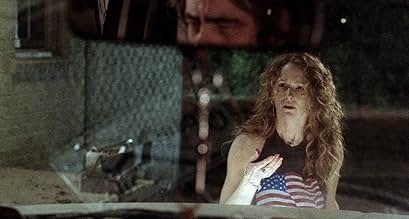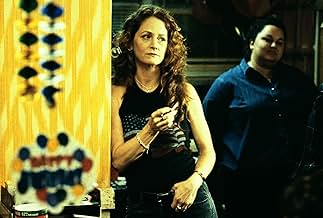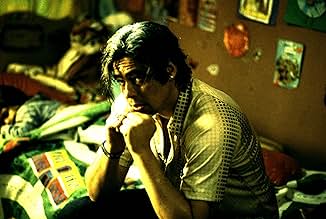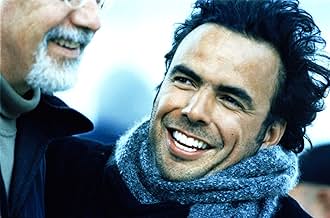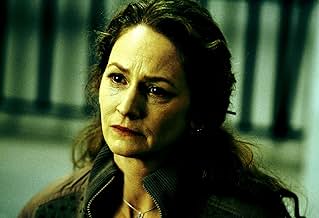Ein außergewöhnlicher Unfall führt einen schwer kranken Mathematiker, eine trauernde Mutter und einen wiedergeborenen ehemaligen Sträfling zusammen.Ein außergewöhnlicher Unfall führt einen schwer kranken Mathematiker, eine trauernde Mutter und einen wiedergeborenen ehemaligen Sträfling zusammen.Ein außergewöhnlicher Unfall führt einen schwer kranken Mathematiker, eine trauernde Mutter und einen wiedergeborenen ehemaligen Sträfling zusammen.
- Regie
- Drehbuch
- Hauptbesetzung
- Für 2 Oscars nominiert
- 30 Gewinne & 79 Nominierungen insgesamt
- Freddy
- (as Marc Thomas Musso)
Empfohlene Bewertungen
That said, the acting is good, and the film is undoubtedly skilfully made. But "people die" is not, in itself, an adequate or interesting unifying theme.
Unlike many other films that use this sort of device, "21 Grams" is a character drama, not a psychological thriller. The story would still work if it were told in chronological order. Why the scenes are arranged as they are is not altogether clear, on the surface. I felt like I was watching a mystery, but after everything came together it became evident that none of the mystery was contained in the plot itself. This fact has led some critics to suggest that the scrambled scene arrangement is nothing more than a cute gimmick designed to make the film more engaging. But I believe that the device does serve a legitimate purpose, by drawing out the complexity of the characters and their situations.
Life is not good for the three principal characters, and it isn't getting better. Sean Penn plays a 40-something man with a failing heart, Naomi Watts plays a young woman facing great tragedy, and Benicio Del Toro plays an ex-con consumed by guilt. Penn and Watts come off as ordinary individuals reacting as anyone might under the circumstances, but Del Toro's character is particularly fascinating. He's been rehabilitated through religion, but he's still far from perfect. As a father, he has a scary presence that makes him seem borderline abusive at times. But he has developed a powerful conscience. Is he right to hate himself for what he did? The movie never answers that question. I just appreciated that the film resisted the temptation to make him into a caricature. He is neither hero nor villain. He is simply understandable on a very basic human level, as are the other two characters.
We have the feeling that Watts and Penn are wrong to condemn him as strongly as they do. They do not understand his situation, or that he's suffering just about as much as they are. On the other hand, we as viewers can perfectly understand where Watts is coming from. That's what makes the scrambled scene arrangement so effective: it never allows any one character to gain our total sympathy. By the time we've sorted out the plot threads, we've identified with all three characters on an emotional level while at the same time understanding their faults. These people are trapped in their own limited worlds, and with our omniscient viewpoint we can scarcely blame any one of them for their feelings or actions. We can see clearly what these characters cannot, which is that they are more victims of cruel fate than people who are truly guilty of anything.
What is the movie's message? That people shouldn't be so quick to judge others? That could be one interpretation, but what's nice about the film is that it doesn't hammer this lesson into us. It just tells a moving and stirring tale about complex characters, and viewers can take from it what they please. The title refers to a parapsychological belief about the weight of the human soul, and it's used in this film as a metaphor for the fragility of life. If life is fragile, then it's also precious, and people need not waste their time on vengeance.
This is not a film for either the faint of heart or lazy of mind. Nor is it for those who become frustrated by film that dares to step outside the linear plot and paint-by-numbers formula. The mishmash of past/present/future is allegorical in the sense that we all carry our past, all hinge our hearts on the future, and all struggle with a `present' as dotty and haunted as this film so wildly illustrates.
In `21 Grams' it is required that the viewer surrender. As in life, there is no control. I must admit that I became a bit antsy and pressed for answers when none were being provided. You are riveted by events and players that intermingle in a haphazard mishmash of time with a rebellious lack of structure. You can either go with the flow-or back out to your car. Since I saw only one person exit the theater, for any reason, in the 125 minutes running time, I conclude that the fully occupied theater was as riveted as I was, even to the point of extreme bladder control.
The performances are stunning. Sean Penn is always good, Benicio Del Toro solidifies his Oscar, and Naomi Watts is the big talent to watch. Her emotional honesty is beyond acting-I believed her to feel the pain she displayed.
The `plot' almost seems inconsequential. The film is about the depth of human feeling in our brief interplay between living and dying. It's about damnation and redemption, revenge and forgiveness, surrender and salvation. It offers no explanations. It merely illustrates the human experience in a trenchant manner that makes us aware that every minute of every day is a precarious drama that we look upon more lightly than we should. The dramatic cortex is the human heart-lost, gained, tormented, anguished and confused. The metaphorical context is the fleeting nature of each heart's temporal beat and our desperately valiant struggle to flesh out our mortal hearts' desires.
Never-the-less, there was something about the structure that I didn't think was all that great. In films like Once Upon a Time in America, Reservoir Dogs, and even Memento, the scrambled story structure had a purpose, adding appropriate twists and turns for the audience. 21 Grams (like Amores Perros in a sense) has that non-linear basis to it too, and sometimes it works for the audience to react. But I think there would be a lot more power to how these characters' fates and tragedies unfold if it was told linearly from start to finish. In many moments in the film I found myself knowing a little too much before a particular scene unfolded, or I found myself guessing about something that I didn't need to (one of the points of non-linear storytelling is answers first, questions later). It wasn't an aspect that made the film bad, yet the stock that writer Guillermo Arriaga and director Inarritu put into this structure over interlocking the stories in order, or perhaps telling each story separately, is the film's only drawback.
It is easy to see why '21 Grams' won't appeal to everybody. It is not an easy watch and there are many other films that have better replay value, but it is still a fine film, with so many great things, that both challenges and rewards those who love the film. '21 Grams' has a non-linear structure that can feel fragmented, and there are a couple of parts that are not as clear as it could have been and cause a little confusion. The ending also could have been better rounded off.
'21 Grams', as always with Iñárritu is a visual and technical marvel, with photography that's gritty, atmospheric, beautiful and intimate, clever editing and striking scenery. Iñárritu's direction is exemplary, with a breath taking vision, mastery of mood and taking risks and not holding back. The music is not amazing but it fits well.
The script in '21 Grams' is tense, poignant and thought-provoking, while most of the story is thematically and dramatically gripping with plenty of intensity and emotional impact as well as a suitably bleak tone. The characters are compellingly real.
Have nothing but praise for the acting, which is some of the best acting of that year. Sean Penn is splendid in one of his best performances, while Naomi Watts' performance is very close to a career-best. Best of all is Benico Del Toro who really gets into the complex meat of his character, an intense and moving performance that in no way falls into hamminess. Melissa Leo and Charlotte Gainsburg are fine too if not in the same league as the three leads.
Overall, challenging but rewarding. 9/10 Bethany Cox
Wusstest du schon
- WissenswertesThe film was shot almost completely with hand-held cameras.
- PatzerWhen the Private Investigator gives Paul the revolver, he flips it open to show that it is loaded. He then spins the cylinder and we hear a ratcheting sound. When a revolver is open, there is no ratchet mechanism connected to the cylinder...it rotates freely and silently.
- Zitate
[last lines]
Paul Rivers: How many lives do we live? How many times do we die? They say we all lose 21 grams... at the exact moment of our death. Everyone. And how much fits into 21 grams? How much is lost? When do we lose 21 grams? How much goes with them? How much is gained? How much is gained? Twenty-one grams. The weight of a stack of five nickels. The weight of a hummingbird. A chocolate bar. How much did 21 grams weigh?
- Crazy CreditsThanks to ÁLos amo!
- SoundtracksCan We Get Together
(2003)
Written by Renee Funderburgh, Anson Funderburgh and John Street
Performed by Anson Funderburgh & The Rockets (as Anson Funderburgh and Rockets)
Licensed courtesy of Bullseye Blues & Jazz, a Rounder Records Group label
By Arrangement with Ocean Park Music Group
Top-Auswahl
- How long is 21 Grams?Powered by Alexa
Details
- Erscheinungsdatum
- Herkunftsland
- Offizieller Standort
- Sprache
- Auch bekannt als
- 21 gramos
- Drehorte
- Produktionsfirmen
- Weitere beteiligte Unternehmen bei IMDbPro anzeigen
Box Office
- Budget
- 20.000.000 $ (geschätzt)
- Bruttoertrag in den USA und Kanada
- 16.290.476 $
- Eröffnungswochenende in den USA und in Kanada
- 274.454 $
- 23. Nov. 2003
- Weltweiter Bruttoertrag
- 60.466.876 $
- Laufzeit2 Stunden 4 Minuten
- Farbe
- Sound-Mix
- Seitenverhältnis
- 1.85 : 1
Zu dieser Seite beitragen




